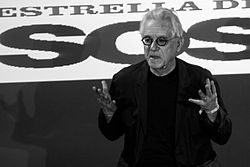Greil Marcus
| Greil Marcus | |
|---|---|

Marcus at , in Murcia, 2014
|
|
| Born |
June 19, 1945 San Francisco, California |
| Nationality | American |
| Citizenship | American |
| Occupation | Author, rock critic, journalist |
| Known for | Rock critic for Rolling Stone, Creem, the Village Voice, and Pitchfork Media |
| Spouse(s) | Jenny Marcus (1966–) |
Greil Marcus (born June 19, 1945) is an American author, music journalist and cultural critic. He is notable for producing scholarly and literary essays that place rock music in a broader framework of culture and politics than is customary in pop music journalism.
Marcus was born Greil Gerstley, in San Francisco, the only son of Greil Gerstley and Eleanor Gerstley, née Hyman. His father, a naval officer, died in December 1944, in the Philippine typhoon that sank the USS Hull, on which he was serving as second-in-command. Admiral William Halsey had ordered the U.S. Third Fleet to sail into Typhoon Cobra "to see what they were made of," and, despite the urging of the crew, Gerstley refused to disobey the order, arguing that there had never been a mutiny in the history of the U.S. Navy. The incident inspired the novel The Caine Mutiny. Eleanor Gerstley was three months pregnant when her husband died. She married Gerald Marcus in 1948, and her son was adopted and took the surname of his stepfather. Greil Marcus has several half-siblings.
Marcus earned an undergraduate degree in American studies from the University of California, Berkeley, where he also undertook graduate studies in political science.
He has been a rock critic and columnist for Rolling Stone (where he was the first reviews editor, paid $30 a week) and other publications, including Creem, the Village Voice, and Artforum. From 1983 to 1989, he was on the board of directors of the National Book Critics Circle. Since 1966 he has been married to Jenny Marcus, with whom he has children.
His book Mystery Train (published in 1975 and in its sixth revised and updated edition in 2015) is notable for placing rock and roll in the context of American cultural archetypes, from Moby-Dick to The Great Gatsby to Stagger Lee. Marcus's "recognition of the unities in the American imagination that already exist" inspired countless rock journalists. On August 30, 2011, Time magazine published a list of its selection of the 100 best nonfiction books since 1923, when the magazine was first published; Mystery Train was on the list, one of only five books dealing with culture and the only one on the subject of American music. Writing for the New York Times, Dwight Garner said, "Mystery Train is among the few works of criticism that can move me to something close to tears. It reverberated in my young mind like the E major chord that ends the Beatles’ “A Day in the Life.”
...
Wikipedia
